四上 UNIT3 MY DAY
2024年译林版四年级英语下册课件Unit3Myday
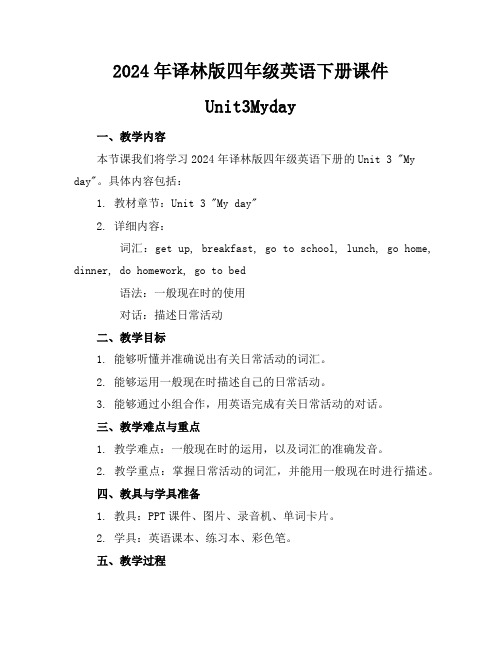
2024年译林版四年级英语下册课件Unit3Myday一、教学内容本节课我们将学习2024年译林版四年级英语下册的Unit 3 "My day"。
具体内容包括:1. 教材章节:Unit 3 "My day"2. 详细内容:词汇:get up, breakfast, go to school, lunch, go home, dinner, do homework, go to bed语法:一般现在时的使用对话:描述日常活动二、教学目标1. 能够听懂并准确说出有关日常活动的词汇。
2. 能够运用一般现在时描述自己的日常活动。
3. 能够通过小组合作,用英语完成有关日常活动的对话。
三、教学难点与重点1. 教学难点:一般现在时的运用,以及词汇的准确发音。
2. 教学重点:掌握日常活动的词汇,并能用一般现在时进行描述。
四、教具与学具准备1. 教具:PPT课件、图片、录音机、单词卡片。
2. 学具:英语课本、练习本、彩色笔。
五、教学过程1. 引入:利用图片展示不同的日常活动,引导学生用中文进行描述。
引导学生关注图片中的活动,为新课学习做好铺垫。
2. 新课展示:呈现PPT课件,展示本节课的学习内容。
教师通过录音机播放听力材料,让学生跟读并模仿。
教师引导学生学习词汇,并让学生进行小组合作,完成对话练习。
3. 例题讲解:教师讲解一般现在时的用法,并通过例句进行解释。
教师示范如何用一般现在时描述日常活动,并让学生模仿练习。
4. 随堂练习:学生根据教师提供的场景,用一般现在时描述自己的日常活动。
教师选取部分学生的描述进行点评,并给予指导。
5. 小组活动:学生分为小组,根据所给话题,用英语完成对话。
各小组进行展示,教师给予评价和鼓励。
六、板书设计1. Unit 3 "My day"2. 词汇:get up, breakfast, go to school, lunch, go home, dinner, do homework, go to bed3. 语法:一般现在时的使用4. 对话示例:描述日常活动七、作业设计1. 作业题目:用一般现在时描述自己的周末活动。
Unit3_My_day教学教材
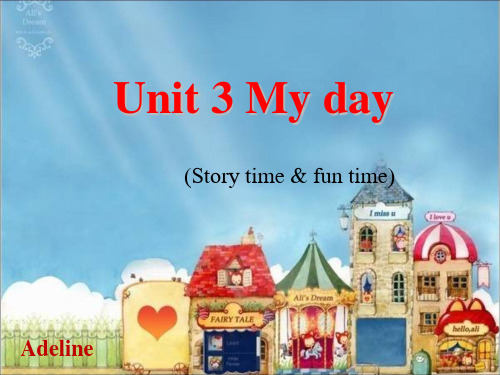
When do you go home?
I go home at___e_l_ev_e_n_t_h_ir_ty__in_t_h_e_m_o_r_n_in.g
我在在上午11:30 回家。
When do you do your homework?
I do my homework at five.
我在五点钟做家庭作业。
bee 蜜蜂he meet 遇见 feed 喂养 week 星期 sheep绵羊
see 看见 need 需要 jeep 吉普车 deep 深的 teeth 牙齿
We see some bees in the tree. Try to read these words in groups.
Fill in the blanks.
I
_______. I usually
________.
I have four lessons _________. I ________.
I have two lessons____________.
I
_______and
__________.
I
________.
Read together. (齐读)
(分角色演)
…
Let’s read or act.
A sweet dream. 一场美梦。
表演时间到了!
请两位组员分工合作, 共同表演这个有趣的故事吧!
} e
mቤተ መጻሕፍቲ ባይዱ she
ee /i:/ green sleep three
Who are we ? Tom , Jack and me. We meet Miss Li at three.
I usually
Unit3_My_day (story time)

Read and circle
自读story time,圈出Mike一天中做不同事的时间
I
_______. I usually
________.
I have four lessons _________. I ________.
Read and circle
自读story time,圈出Mike一天中做不同事的时间
have lunch
吃午饭
I have lunch at__________.
我在…吃午饭。
go to bed
睡觉Hale Waihona Puke at night在夜里
I go to bed at__________.
我在…睡觉。
Magic eyes
play football
踢足球
watch TV
看电视
Unite 3 My day
Unite 3 My day
(Story time)
Adeline
9 40
at six fifty 在 6:50
I get up at__________.
我在…起床。
go to school
上学
I go to school at__________.
我在…去学校。
go home
回家
in the morning
1.Read it by girls and boys 2.Do a role-play
Summary
回忆今天一共学习了哪些短语?
Homework
1.读story time 三遍。 2.抄写短语3英一中。 3.完成《伴你学》story time剩余题目。
通常,常常
泸定县中心小学四年级英语下册Unit3Myday第4课时教案+说课稿新版牛津译林版
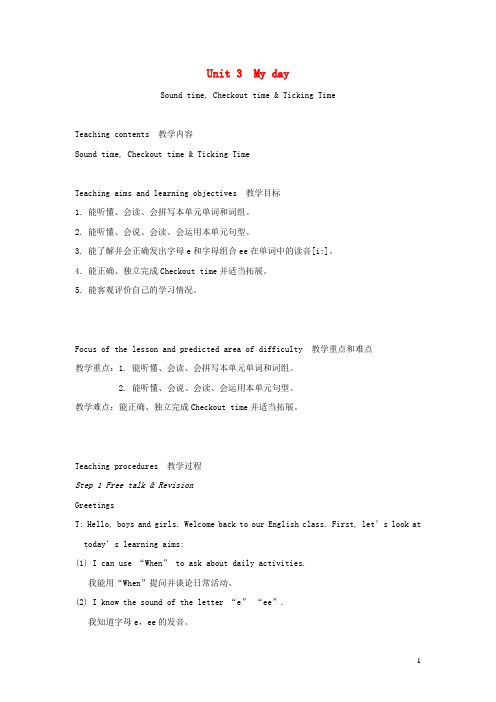
Unit 3 My daySound time, Checkout time & Ticking TimeTeaching contents 教学内容Sound time, Checkout time & Ticking TimeTeaching aims and learning objectives 教学目标1. 能听懂、会读、会拼写本单元单词和词组。
2. 能听懂、会说、会读、会运用本单元句型。
3. 能了解并会正确发出字母e和字母组合ee在单词中的读音[i:]。
4. 能正确、独立完成Checkout time并适当拓展。
5. 能客观评价自己的学习情况。
Focus of the lesson and predicted area of difficulty 教学重点和难点教学重点:1. 能听懂、会读、会拼写本单元单词和词组。
2. 能听懂、会说、会读、会运用本单元句型。
教学难点:能正确、独立完成Checkout time并适当拓展。
Teaching procedures 教学过程Step 1 Free talk & RevisionGreetingsT: Hello, boys and g irls. Welcome back to our English class. First, let’s look at today’s learning aims:(1) I can use “When” to ask about daily activities.我能用“When”提问并谈论日常活动。
(2) I know the sound of the letter “e” “ee”.我知道字母e,ee的发音。
(3) I can talk about my day.我能谈论自己一天的作息活动。
T: Are you ready for today’s lesson?S: Yes.T: Here we go!Asking time(你想了解Miss/Mr …吗?请试着用所给的提示词问些问题吧!看看谁的反应最快哦!) 【设计意图:通过师生交互问答,巩固本单元重点句型,同时营造宽松和谐的课堂气氛。
译林版四年级英语上册Unit3单元课件

A:Hello, …. When do you …? B: I usually… at ….
知识回顾:
• 我们掌握与我们日常生活有关的短语:
• in the morning , in the afternoon , in the evening ,go home , go to school , watch TV , homework ,usually
你是好学者!
Notes: 1. usually 通常,常常
表示时间频率的副词还有:always总是, often 经常, sometimes有时, never从不
2. homework 家庭作业 home-- work 3. dinner 晚饭 have dinner 吃晚饭
breakfast 早饭, lunch午饭 have breakfast 吃早饭 have lunch吃午饭
01
自学提示<一>: 3分钟
在小组内以“This is me”话题说一段话。
02
老师抽查!
03
你是会话高手哦!
自学提示<二>: 5分钟
看动漫完成表格。先看懂表格,再看动漫。完成后 可在小组内交流、订正。(组长负责) U3Stor y.swf
Activity (活动)
Get up
7:00
Go to school
Have lunch Play football DHoavme ydihnnoemr ework
HGaov etodbi nedn e r
12:00 5:30 7:00
Time
7:40 4:00 6:15 9:00
自学提示<三>: 5分钟
在小组内自读课文, 找出不会读、不理 解的词,在小组内 互教互学。 可向老 师请教。
小学四年级英语下册4B Unit3 My day知识点整理

小学四年级英语下册4B Unit3 My day知识点整理四会单词1. have lunch 吃午饭2. homework 家庭作业3. have dinner 吃晚饭4. watch TV 看电视5. in the evening 在晚上三会单词ually 通常,常常2. go to school 去学校3. in the morning 在上午4. in the afternoon 在下午5.play football 踢足球6.go home 回家7. go to bed 去睡觉8.at night 在夜间四会词组1.my day 我的一天2. this morning 今天上午3. this afternoon 今天下午4. this evening 今天晚上5. in the morning 在上午6. in the afternoon 在下午7. in the evening 在晚上8.go to school 上学9. go to bed 睡觉10. go to park 去公园11. go to zoo 去动物园12. go home 回家13.have breakfast 吃早饭14. have lunch 吃午饭15. have dinner 吃晚饭16. watch TV 看电视17. at night 在夜间18. get up 起床19. at seven forty 在起点四十20. do my homework 做家庭作业三会词组1. over there 在那儿2. What a big cake ! 好大一个蛋糕!四会句型1. When do you get up every day ? 你每天几点起床?I get up at seven . 我七点起床。
三会句型1. I usually go to school at seven forty. 我通常7:40 上学。
译林版英语四年级下册Unit3 My day 知识点归纳
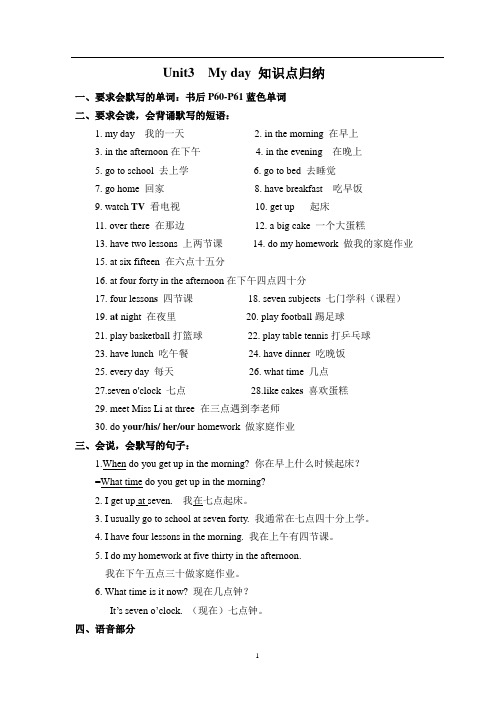
Unit3 My day 知识点归纳一、要求会默写的单词:书后P60-P61蓝色单词二、要求会读,会背诵默写的短语:1. my day 我的一天2. in the morning 在早上3. in the afternoon在下午4. in the evening 在晚上5. go to school 去上学6. go to bed 去睡觉7. go home 回家8. have breakfast 吃早饭9. watch TV看电视10. get up 起床11. over there 在那边12. a big cake 一个大蛋糕13. have two lessons 上两节课14. do my homework 做我的家庭作业15. at six fifteen 在六点十五分16. at four forty in the afternoon在下午四点四十分17. four lesson s 四节课18. seven subject s 七门学科(课程)19. at night 在夜里20. play football踢足球21. play basketball打篮球22. play table tennis打乒乓球23. have lunch 吃午餐24. have dinner 吃晚饭25. every day 每天26. what time 几点27.seven o'clock 七点28.like cake s喜欢蛋糕29. meet Miss Li at three 在三点遇到李老师30. do your/his/ her/our homework 做家庭作业三、会说,会默写的句子:1.When do you get up in the morning? 你在早上什么时候起床?=What time do you get up in the morning?2. I get up at seven. 我在七点起床。
myday, 四上,英语作文
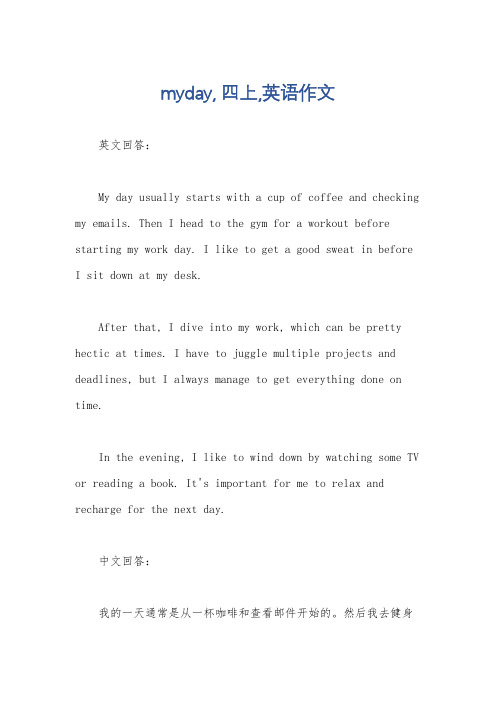
myday, 四上,英语作文
英文回答:
My day usually starts with a cup of coffee and checking my emails. Then I head to the gym for a workout before starting my work day. I like to get a good sweat in before I sit down at my desk.
After that, I dive into my work, which can be pretty hectic at times. I have to juggle multiple projects and deadlines, but I always manage to get everything done on time.
In the evening, I like to wind down by watching some TV or reading a book. It's important for me to relax and recharge for the next day.
中文回答:
我的一天通常是从一杯咖啡和查看邮件开始的。
然后我去健身
房锻炼一下,然后再开始工作。
我喜欢在坐下来工作之前先出一身汗。
接下来,我会投入到工作中,有时候工作会很忙碌。
我必须同时处理多个项目和截止日期,但我总能及时完成所有工作。
晚上,我喜欢通过看电视或读书来放松。
对我来说,放松和充电是很重要的,为了迎接第二天。
译林版四年级下册英语Unit3《My day》教学反思-最新

译林版四年级下册英语Unit3《My day》教学反思
本单元的教学内容主要是帮助学生学会表达自己在什么时间做的什么事情。
在导入的时候,我以自己为例,阐述了一下自己的一天,并且将所做的事情与时间统一的板书在黑板上,让学生一目了然。
然后,我让学生根据我的格式将自己的时间表也写在黑板上,两者之间进行对比。
同时注意介词at的用法以及位置的介绍。
然后引出本课的主人翁Mike,非常的顺利,学生也都能较好的理解。
在第二课时的时候开始渗透句型when do you …?并结合板书,采取教师示范演说,学生逐个模仿的形式来操练句型。
为了帮助学生记住句型我总结出:看到when 我们要到答句当中去寻找at.同时补充介绍when 与 what time之间的区别与联系,在做题的过程中给予一定的指导,后来发现学生对于when的理解比较深刻,而对于what time 的运用缺乏一定的意识性。
经过几次的练习反馈,在这方面还要增加一定的练习。
本单元我们也开始接触到第四单元的重点句型,在内容的渗透上要把握好一定的度,不能喧宾夺主。
总的来说,学习完这一单元之后,学生大多数能够正确的阐述自己的日常生活,但是词组的记忆仍然是一个难点,虽然读音不是问题,但是单词的拼写对于四年级的学生来说,相对较难。
可能需要很长一段时间的不断训练,不断听写,才能取得比较好的结果。
myday, 四上,英语作文
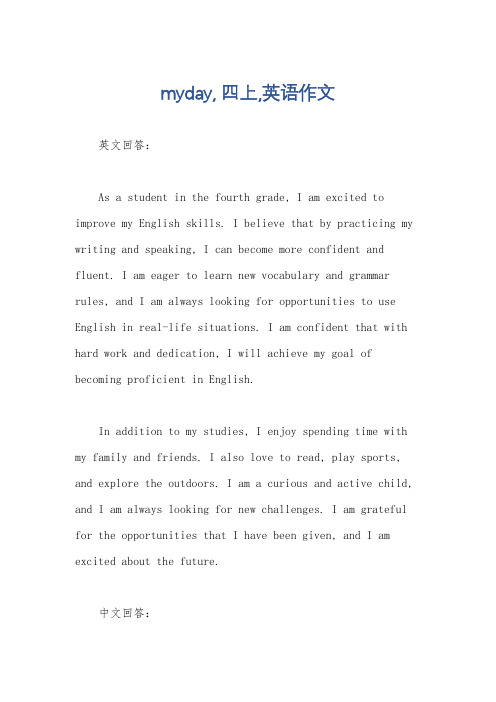
myday, 四上,英语作文英文回答:As a student in the fourth grade, I am excited to improve my English skills. I believe that by practicing my writing and speaking, I can become more confident and fluent. I am eager to learn new vocabulary and grammar rules, and I am always looking for opportunities to use English in real-life situations. I am confident that with hard work and dedication, I will achieve my goal of becoming proficient in English.In addition to my studies, I enjoy spending time with my family and friends. I also love to read, play sports, and explore the outdoors. I am a curious and active child, and I am always looking for new challenges. I am grateful for the opportunities that I have been given, and I am excited about the future.中文回答:作为一名四年级的学生,我很高兴能提高我的英语水平。
我相信,通过练习写作和口语,我能变得更加自信和流利。
我渴望学习新的词汇和语法规则,并且我一直在寻找机会在真实场景中使用英语。
译林版四年级下Unit3 My day 单元知识与词句总结

译林版四年级下Unit3 My day 单元知识与词句总结一、重点词组:1. in the morning在早上2. in the afternoon 在下午3. in the evening 在晚上4.at night 在夜里5.have lunch 吃中饭6. have dinner吃晚饭7. go home 回家8. play football 踢足球9. watch TV 看电视10. go to bed 去睡觉11.go to school 去上学12. get up起床13. at seven o'clock 在七点14. at four forty在四点四十分15.do my/ your/ his/ her/our homework做(我的/你的/他的/她的/我们的回家作业16. what time 什么时候17. at half past twelve(twelve thirty) 在十二点半18. over there 在那边19. like cakes 喜欢蛋糕(可数名词复数)20. have breakfast 吃早饭21. my day 我的一天22.Mike's day 迈克的一天23. at five thirty every day 在每天五点三十分24. be hungry饿的25.meet Miss Li at three在三点遇到李老师26. at a quarter past three in the afternoon 在下午三点一刻(at three fifteen in the afternoon)27. Miss Yang's day 杨老师的一天二、重点句型:(时间的两种同义表达都要掌握)1. When do you usually go to school in the morning?你通常早晨什么时候去上学?I usually go to school at seven fifty(ten to eight) in the morning.我早晨通常七点五十分去上学。
《Unit 3 My day》集体备课教案

4. T make a model, change the name, ask and sing. Then change the phrases, ask and sing.
(师做动作,学生快速说出表示的单词或短语)
Step 2 Presentation
1.(Show Mike.)
Yesterday we learnt about Mike’s daily life. Now let’s look back again.
2.(出示钟面)
What time is it?
Ss: It’s seven o’clock.
作业设计:1.Copy the new words and phrases.
2.Introduce your day to your parents.
二次备课
板书设计:
Unit 3 My day
get up
…
go home
…
watch TV
…
go to bed
in the morning
When do you in the afternoon
Ss: When do you get up/…?
T: Good questions. Let’s listen to the song, and try to answer: When does Peter get up/go to school?
2. Listen to the song and try to answer the questions.
四年级英语Unit3 My day家庭作业和答案
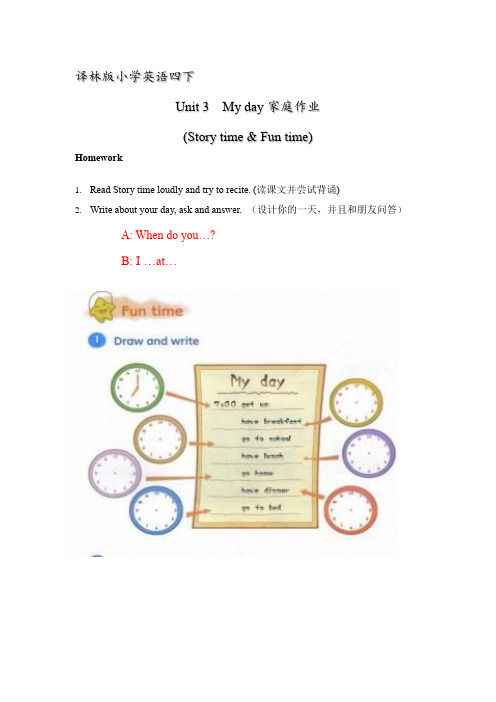
译林版小学英语四下Unit 3 My day家庭作业(Story time & Fun time) Homework1.Read Story time loudly and try to recite.(读课文并尝试背诵)2.Write about your day, ask and answer. (设计你的一天,并且和朋友问答)A: When do you…?B: I …at…译林版小学英语四下Unit 3 My day家庭作业答案(Story time & Fun time)Homework3.Read Story time loudly and try to recite. (略)4.Write about your day, ask and answer. (答案不唯一,仅供参考)A: When do you get up in the morning?B: I get up at seven.A: When do you have breakfast in the morning?B: I have breakfast at seven ten.A: When do you go to school in the morning?B: I go to school at seven twenty.A: When do you have lunch?B: I have lunch at twelve.A: When do you go home in the afternoon?B: I go home at four thirty.A: When do you have dinner in the evening?B: I have dinner at six o’clock.A: When do you go to bed at night?B: I go to bed at nine.。
四年级下册英语Unit 3 My day知识梳理+巩固练习 译林版三起

Unit 3 My day知识梳理+巩固练习(含答案)一、语音解析:字母e及字母组合ee在单词中发/i:/,例如:例如:m e, sh e, gr ee n, sl ee p, thr ee二、重点单词四会usually通常,尝尝homework家庭作业三会morning早晨;上午lunch午饭afternoon下午home家dinner晚餐watch观看evening傍晚;晚上night夜;深夜there在那里read阅读;朗读三、核心短语go to school去上学go to bed睡觉in the afternoon在下午go home回家do my homework做我的家庭作业watch TV看电视in the evening在晚上my day我的一天have dinner吃晚饭at night在夜里play football踢足球have lunch吃午饭have four lessons上四节课every day每天over there在那边have breakfast吃早饭四、重点句型1. I usually go to school at seven forty.解析:usually意为“通常,常常”,是频度副词,常放在be动词之后,行为动词之前。
句型“主语十频度副词十动词(短语)十时间状语”用于表达某人在某时做某事的频率。
例句:I usually play table tennis after school.2. I do my homework at five thirty.解析:“做某人的家庭作业”一般用“do十形容词性物主代词十homework”来表达,其中的形容词性物主代词与主语在人称上要保持一致。
如果主语是第三人称单数,do要改为does。
此外,homework是不可数名词,在句子中作主语时,谓语动词要用第三人称单数形式。
例句:(l)We do our homework at home in the evening.(2)Liu Tao does his homework at six ten.3. evening和night的用法解析:evening意为“晚上;傍晚”,一般指下午六点到晚上就寝前的这设时间,其前一般用介词in。
译林版《英语》四(下)Unit_3_My_day单元主题教学设计

一、单元内容分析本单元是译林版《英语》四(下)Unit 3My day ,主题是谈论一天的作息安排。
就文本呈现方式而言,Story time 中Mike ’s day 是一篇连续性文本,详细介绍了Mike 的一天,Cartoon time 中的文本以对话形式展开,是一篇非连续性文本,描述了Bobby 有趣的梦;就文本价值而言,根据本单元每个板块的安排,逐渐引导学生有序、合理地安排自己的一天,使自己的生活变得丰富而有意义。
二、单元学情分析在进行单元整体设计时,首先要做的就是学情分析,依循学科核心素养,笔者将从语言能力、文化意识、思维品质和学习能力这四个方面进行分析。
1.语言能力语言能力分为语言知识和语言技能两方面。
从语言知识层面,本单元重点学习了时间和日常活动的表达,同时要学会用“When do you...?I...at...”进行对话和陈述,在三(下)Unit 6What time is it?这一课中,学生能够对整点的时间进行准确表达,但对于分钟的表达还不太了解。
在四(上)Unit 4I can play basketball 这一课中,学生已经掌握了一些关于运动类的动词短语,并且基于平时的积累,学生对于本课中大部分动词短语都不陌生。
对于句型,在本册Unit 2Cartoon time 中已经有所渗透;从语言技能层面,学生能够简单绘制timetable ,并根据导图简单描述,但对于准确表达一天的安排,以及如何有序、连贯、多元地描述,还需要进一步学习和引导。
2.文化意识学生知道自己一天的安排,但描述起来会混乱,所以如何准确描述,以及如何有序或合理地安排一天的时间还需要教师的引导。
至于如何安排丰富或有意义的一天,还需要更多的输入和进一步的思考。
3.思维品质学生能较好地理解文本,把握文本框架和内容,较快地达成思维的准确性。
但在本课的学习过程中,还需要学生改编歌曲、续编故事等,从以往的课堂表现来看,学生思维的创造性有待加强。
Unit3Myday定稿教案

Unit 3 My day(Story time)第一课时一、教学目标:1.在情境中学习词汇和动词短语go to school, usually, in the morning, have lunch, do home, do my homework, have dinner, watch TV, go to bed.2.能够在情境中整体感知内容。
3.能够较准确地朗读课文并在教师的指导下尝试表演。
4.能初步运用本课所学的词汇和句型I …at …描述人物的日常活动。
二、教学重点:能在情境中正确地朗读理解内容,并能准确朗读。
三、教学难点:1.读准单词usually。
2.能够较准确地朗读课文并在教师的指导下尝试表演。
四、教学准备:练习纸,PPT,写好课题。
五、课前预习:填填自己的作息时间表。
My day六、教学过程:Step 1:Greeting and warm upWhat day is it today? Spell it.How many lessons do you have today?What lessons do you have in the moring?Step 2: Review1.Today, we will learn “Unit 3 My day”.Look. ( Read ticking time) Are you clear?2.Let’s play a game.3.There are the numbers from 1 to 12. What is it?What time is it? It is ……(Practice)4. Oh,it’s seven fifty. It’s time for school. I go to school at sevev fifty. When do you go to school?(ask and answer)5. I have a busy day . What do I do every day? Please look. First, I get up……(呈现有关动词词组)What about your day? (Teach: do my homework, watch TV )6. Use “I …at …” make sentences.Step 3: Present1.We have many activeties every day. How about Mike’s day? Let’s listen and tick.(check the answer)看动画,选择Mike一天所做的事,在相应的括号前打“√”。
英语作文《我的一天》四年级上册,八行
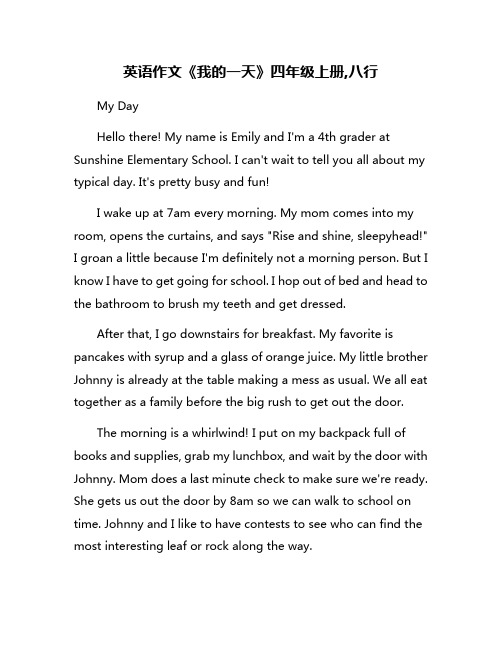
英语作文《我的一天》四年级上册,八行My DayHello there! My name is Emily and I'm a 4th grader at Sunshine Elementary School. I can't wait to tell you all about my typical day. It's pretty busy and fun!I wake up at 7am every morning. My mom comes into my room, opens the curtains, and says "Rise and shine, sleepyhead!"I groan a little because I'm definitely not a morning person. But I know I have to get going for school. I hop out of bed and head to the bathroom to brush my teeth and get dressed.After that, I go downstairs for breakfast. My favorite is pancakes with syrup and a glass of orange juice. My little brother Johnny is already at the table making a mess as usual. We all eat together as a family before the big rush to get out the door.The morning is a whirlwind! I put on my backpack full of books and supplies, grab my lunchbox, and wait by the door with Johnny. Mom does a last minute check to make sure we're ready. She gets us out the door by 8am so we can walk to school on time. Johnny and I like to have contests to see who can find the most interesting leaf or rock along the way.We arrive at school and I give my mom a hug goodbye. Then I head inside to my 4th grade classroom. My best friend Anna always saves me a seat and we chat before class starts at 8:30am.The morning goes by super fast. We have reading group first where we take turns reading pages from our latest book out loud. After that is math where we learn about multiplication and division. Those are my favorite subjects!Around 11am, we get ready to go to lunch and recess. We line up and walk quietly to the cafeteria. I always get the hot lunch which is something like chicken nuggets, mashed potatoes, and a fruit cup. Anna and I like to talk and joke around at our usual lunch table.Once we're done eating, it's time for recess outside! That's definitely the best part of the day. I love running around on the playground, going down the big twisty slide, and playing on the swings. Before we know it, the bell rings and recess is over. We have to line up again and head back inside.In the afternoon, we have science class where we get to do experiments. My favorite was the baking soda and vinegar volcano! We also have social studies where we learn about geography and history. On certain days, we have fun classes like art, music, gym, and computer lab too.Finally, it's 3pm and the end of the school day. We pack up our backpacks and get ready to go home. The bus kids line up first to go to the cafeteria for bus dismissal. Then the kids who get picked up go to wait in a separate area.I'm a walker, so I meet up with Johnny and we start our journey home together. We like to stop at the park on the way back. We play for a little while before finally getting home around 4pm.Once I'm home, I have a small snack and get started on my homework right away. I try to get as much done as I can before dinner at 6pm. After dinner, I take a break to watch a TV show or play outside if it's nice out. Then it's back to any more homework left to finish up.Around 8pm, I start getting ready for bed. I take a shower, put on my pajamas, and do my nightly routine like brushing my teeth again. I read out loud to my parents or little brother for 20 minutes too. We all say goodnight and I'm off to sleep for another day!Well, that's basically what my day is like as a 4th grade student. It's a lot of running around between school, activities, homework and more. But I love my daily routine and all the fun I have throughout it. Being a kid is hard work but it's the best!。
最新4B+Unit+3+My+day+Story+time课件ppt课件

While-reading Listen and read
I get up at seven. I usually go to school at seven forty. I have four lessons in the morning. I have lunch at twelve.
While-reading Listen and read
While-reading Let’s learn
Try to ask Mike(试试看,问Mike)
Mike, Mike, when do you…?
What else does Mike do in the morning? Mike在上午还有什么活动 ?
While-reading
Let’s read
I ha've fo' ur le' ssons in the mo' rning.
I ha' ve lu' nch at twe' lve.
While-reading Read and order 读读,排序
( 4) I do my homework
at five thirty.
( 3) I go to bed at nine
I have two lessons in the afternoon. I play football at four and go home at four forty. I do my homework at five thirty. I usually have dinner at six fifteen. and watch TV at seven. I go to bed at nine every day.
- 1、下载文档前请自行甄别文档内容的完整性,平台不提供额外的编辑、内容补充、找答案等附加服务。
- 2、"仅部分预览"的文档,不可在线预览部分如存在完整性等问题,可反馈申请退款(可完整预览的文档不适用该条件!)。
- 3、如文档侵犯您的权益,请联系客服反馈,我们会尽快为您处理(人工客服工作时间:9:00-18:30)。
四上 Unit3 My day
第一课时
吴燕娟
教学内容
江苏译林版牛津英语四年级上册U3 Story time
教学时间
学情分析
本单元主要讲述学生在学校里的一天生活,这是孩子们特别喜欢的上课内容,作为长城小学的学生,基础英语基本功不扎实,很多单词拼读不正确,分析文章的能力也一般,但是他们天生的学习热情还是值得点赞的。
课前我要求学生准备一份每天的时间表,活动表。
4月2日
教学目标
<基础性目标>
1.能听懂、能理解、会读课文。
2.能听懂、会说、会读单词usually, go to school, in the morning, in the evening, in the afternoon, go home, homework, watch TV, have four lessons, have lunch, play football, do my homework, have dinner, go to bed, every day
3.初步理解、会读句型:
When do you get up/…?
I usually… at… .
<提高性目标>
1.能大声流利地朗读课文,并尝试复述课文。
2.能用英语简单介绍自己一天的生活。
教学重点
1. 能听懂、能理解、会读课文。
2. 能用英语表述文中人物一天的生活。
教学难点
1. 能听懂、能理解、会读课文。
2. 能明白并用英语表述自己一天的生活。
教学准备
教学光盘单词卡
教学过程
Step1 Organization。
